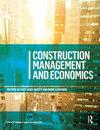总编辑的反思:在建筑管理和经济学方面进行重要而有趣的研究,以应对新出现的挑战
IF 3.3
Q2 BUSINESS
引用次数: 0
摘要
2020年1月,当我担任《建筑管理与经济学》主编时,我在开篇社论中认为,该杂志有空间进行研究,解决围绕我们时代重大社会挑战的重要而有趣的问题(Chan 2020)。因此,我很高兴在《转型建筑》特刊的后面分享我的最后编辑思考,这是我担任主编期间委托出版的几期特刊之一,重点关注建筑管理和经济学研究人员和从业者面临的一些关键的持续挑战。其他问题包括“施工缺陷、危险、中断和争议”(2021年第39卷第12期);“可持续建筑翻新”(第40卷,2022年第3期),以及纪念Glenn Ballard博士及其对精益建筑领域的贡献的Festschrift期刊(第40册,2022年7–8期)。关于我们城市面临的重大挑战的特刊,以及基于从新冠肺炎全球大流行中吸取的教训的特刊仍在酝酿中。在撰写开幕社论时,当我思考重大的社会挑战时,我无法想象新冠肺炎全球大流行的爆发及其对学术生活的影响。尽管对全球疫情影响的分析仍在进行中,而且可能会持续一段时间,但编辑团队仍然经历了编辑过程延误的影响。在过去三年中,我们做出编辑决定的平均周转时间略有上升,仅为33天多一点,这可能表明学术生活中工作量和时间压力的增加带来了挑战。与此同时,编辑团队还在同一时期对1760份稿件做出了决定,接受率为13.3%,这意味着向该杂志提交的稿件有所增加,接受率略低于前三年。无论如何,就编辑决定的周转时间而言,一线希望就在眼前;在2022年的过去11个月里,这一数字似乎已降至平均不到27天,与疫情前的水平一致。因此,编辑小组感谢同行评审员的支持,本期末尾附有同行评审员名单。《建筑管理与经济学》四十年:庆祝、纪念和反思期刊连续性的时刻本文章由计算机程序翻译,如有差异,请以英文原文为准。
Reflections from the Editor-in-Chief: confronting emerging challenges with important and interesting research in Construction Management and Economics
When I took on the role of Editor-in-Chief for Construction Management and Economics in January 2020, I argued in the opening editorial that there is room for the journal to feature studies that tackle important and interesting questions surrounding the grand societal challenges of our time (Chan 2020). Thus, it gives me great pleasure to share my final editorial reflections at the back of the special issue of “Transforming Construction”, one of several special issues commissioned during my tenure as Editor-in-Chief that focus on some of the key ongoing challenges confronting researchers and practitioners in construction management and economics. The other issues included “Construction Defects, Danger, Disruption and Disputes” (Volume 39, Issue 12, 2021); “Sustainable Building Renovation” (Volume 40, Issue 3, 2022), and the Festschrift issue in honour of Dr. Glenn Ballard and his contribution to the field of lean construction (Volume 40, Issues 7–8, 2022). Still in the pipeline is the special issue on grand challenges facing our cities, as well as one based on the lessons learnt from the Covid-19 global pandemic. When thinking about grand societal challenges at the time of writing the opening editorial, I could not have imagined the onset of the Covid-19 global pandemic and its impacts on academic life. While analyses of the impacts of the global pandemic are still ongoing and will likely continue for some time, the Editorial Team has nevertheless experienced impacts of delays to the editorial process. Our average turnaround time for making editorial decisions over the past three years has crept up slightly to just over 33 days, indicating perhaps the challenges arising from increased workload and time pressures in academic life. At the same time, the Editorial Team also made decisions on 1,760 manuscripts over the same period with an acceptance rate of 13.3%, representing an increase in submissions to the journal and a slightly lower acceptance rate than the previous three years. In any case, there is a silver lining in the horizon where the turnaround time for an editorial decision is concerned; this appears to have reduced to just under 27 days on average over the past 11 months in 2022, which is in line with pre-pandemic levels. The Editorial Team is therefore grateful for the support given by the peerreviewers, a list of which is appended at the end of this issue. Forty years of Construction Management and Economics: a moment to celebrate, commemorate and reflect for the continuity of the journal
求助全文
通过发布文献求助,成功后即可免费获取论文全文。
去求助
来源期刊

Construction Management and Economics
BUSINESS-
CiteScore
7.50
自引率
14.70%
发文量
58
期刊介绍:
Construction Management and Economics publishes high-quality original research concerning the management and economics of activity in the construction industry. Our concern is the production of the built environment. We seek to extend the concept of construction beyond on-site production to include a wide range of value-adding activities and involving coalitions of multiple actors, including clients and users, that evolve over time. We embrace the entire range of construction services provided by the architecture/engineering/construction sector, including design, procurement and through-life management. We welcome papers that demonstrate how the range of diverse academic and professional disciplines enable robust and novel theoretical, methodological and/or empirical insights into the world of construction. Ultimately, our aim is to inform and advance academic debates in the various disciplines that converge on the construction sector as a topic of research. While we expect papers to have strong theoretical positioning, we also seek contributions that offer critical, reflexive accounts on practice. Construction Management & Economics now publishes the following article types: -Research Papers -Notes - offering a comment on a previously published paper or report a new idea, empirical finding or approach. -Book Reviews -Letters - terse, scholarly comments on any aspect of interest to our readership. Commentaries -Obituaries - welcome in relation to significant figures in our field.
 求助内容:
求助内容: 应助结果提醒方式:
应助结果提醒方式:


